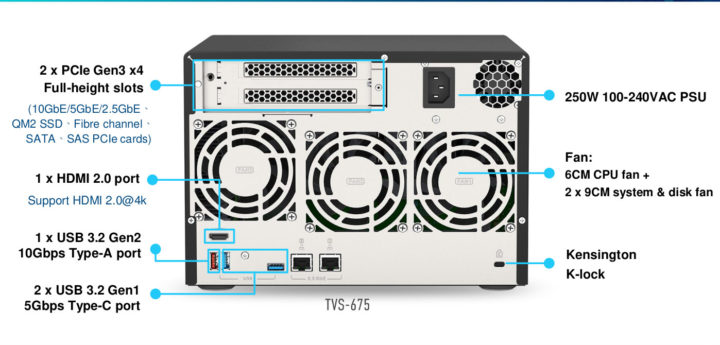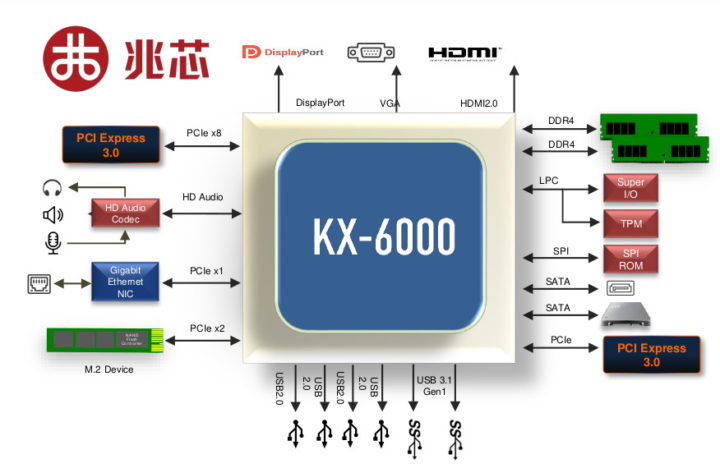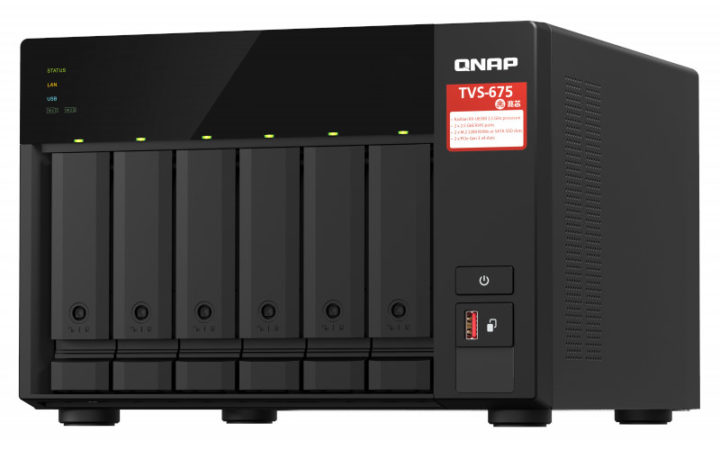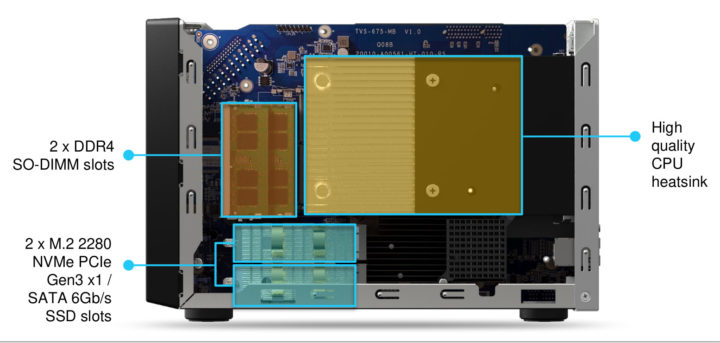QNAP has been trying something different in several in their new NAS recently. Last month, we covered QMiroPlus-201W that combines an Arm router and Intel NAS into one device, and now the company has announced another x86 NAS, but not based on Intel or AMD processor, but instead Zhaoxin’s 2.5 GHz eight-core KaiXian KX-U6580 processor.
QNAP TVS-675 NAS comes with 8GB RAM by default, six drive bays for hard drives or SSD’s, two M.2 2280 slots for SATA or NVMe storage, as well as two PCIe 3.0 x4 slots for networking, storage, or other expansion cards. The NAS also features 2.5GbE wired connectivity and an HDMI 2.0 to connect a display.
QNAP TVS-675 specifications:
- SoC – Zhaoxin KX-U6580 8-core/-thread 64-bit x86 processor @ 2.5GHz with FPU, AES-NI accelerator, 8MB L2 cache, ZhaoXin C-960 Graphics; 16nm process
- System Memory – 8 GB DDR4 single-channel; upgradable to up to 64GB dual-channel memory
- Storage
- 5GB flash storage (Dual boot OS protection)
- Drive Bay – 6x 3.5-inch SATA 6Gb/s compatible with 3.5-inch and 2.5-inch SATA HDD or SSD; Hot-swappable
- 2 x M.2 2280 PCIe Gen 3 x1 or SATA 6Gb/s slots with SSD Cache Acceleration Support
- Networking
- 2x 2.5 Gigabit Ethernet ports (2.5G/1G/100M)
- Optional 5 Gigabit Ethernet or 10 Gigabit Ethernet via adapter
- Wake on LAN (WOL) support on 2.5GbE ports
- Max. Number of Concurrent Connections (CIFS) – 2,000 with max. memory
- USB – 2x USB 3.2 Gen 1 ports, 2x USB 3.2 Gen 2 (10Gbps) ports
- Video Output – HDMI 2.0 up to 4Kp60
- Video – H.264/265 hardware transcoding support
- Expansion – 2x PCIe Gen 3 x4 slots
- Misc
- LED Indicators: HDD 1-6, Status, LAN, USB, M.2 SSD 1-2)
- Buttons: Power, Reset, USB Copy
- 3x 80mm 12V fans
- Buzzer
- Kensington lock support
- Power Supply – 250W, 100-240V AC, 50/60Hz, 3.5A
- Power Consumption – HDD Sleep Mode 41.897 W; operating mode: 60.794 W (typ.)
- Dimensions (HxWxD) – 188.2 × 263.9 × 280.8 mm
- Weight – 6.2 kg
- Temperature Range – Operating: 0 – 40°C; storage: -20 – 70°C
- Relative Humidity – 5-95% RH non-condensing, wet bulb: 27C (80.6F)
 The NAS runs QTS 4.5.3 embedded Linux by default, but it’s also possible to install QuTS hero and Ubuntu 18.04/20.04 for a dual boot system. The device ships with an Ethernet cable, a power cord, various screws to mount the drivers, two M.2 SSD heatsinks, drive tray keys, and a Quick Installation Guide (QIG).
The NAS runs QTS 4.5.3 embedded Linux by default, but it’s also possible to install QuTS hero and Ubuntu 18.04/20.04 for a dual boot system. The device ships with an Ethernet cable, a power cord, various screws to mount the drivers, two M.2 SSD heatsinks, drive tray keys, and a Quick Installation Guide (QIG).
QNAP also offers a wide range of PCIe expansions cards for networking (5GbE, 10 GbE, WiFI 6, etc..), storage (M.2, SAS, etc..) , or a combination of the two.

Zhaoxin KX-U6580, and other KX-6000 series processors, are said to offer lower latency while running multi-task applications, hardware 4K video
transcoding, 4K video output via HDMI 2.0, and VT-x and IO virtualization
for running multiple virtual machines (VM).
While Zhaoxin x86 (and Arm) processors have mainly been found in products sold in mainline China, QNAP TVS-675 will be distributed worldwide. Performance-wise Zhaoxin KX-U6580 appears to offer performance similar to an Intel Celeron J4105 quad-core Gemini Lake processor, mostly due to the eight cores as single-thread performance is on the weaker side. It does not seem to be the most efficient processor either based on the NAS 40+ W idle power.
More details can be found on the product page, which also includes a 56-page presentation.
Via Liliputing and Tom’s Hardware

Jean-Luc started CNX Software in 2010 as a part-time endeavor, before quitting his job as a software engineering manager, and starting to write daily news, and reviews full time later in 2011.
Support CNX Software! Donate via cryptocurrencies, become a Patron on Patreon, or purchase goods on Amazon or Aliexpress. We also use affiliate links in articles to earn commissions if you make a purchase after clicking on those links.







It has integrated from factory Chinese Spy Services >.<
Backdoor included at no extra cost.
So just like AMD, Apple, Arm and Intel, government state backdoors included.
Just like the Joe Biden government tells Facebook, who can post and who’s thoughts are banned from being published
I think it’s more to be consistent with QNAP’s other products (Hi Walter!).
“Performance-wise Zhaoxin KX-U6580 appears to offer performance similar to an Intel Celeron J4105”.
My main question: WHY?
To save a few dollars on the CPU?
Or is this a Higher Plan (read: law) from the Chinese government? An obligation towards suppliers into the Chinese market: hard requirements on percentage of Chinese CPU’s, going up each year. Just like the Californian (and USA?) government introduced a long time ago on overall car MPH usage and CO2 emission.
That would be an interesting and understandable step from the Chinese government.
Please. Always check the information that the editors write and share.
Here you find a comparison of Zhaoxin KaiXian KX-U6580 2.5GHz vs. Intel Pentium Silver N6000 1.1GHz – 3.3GHz Boosts with the latest Tremont cores.
source: https://www.forum-3dcenter.org/vbulletin/showthread.php?t=607246
What does that change in the question and logic of my post?
CO2 / MPG regulations wouldn’t be good analogy to this as those regulations does not force Honda and Toyota to use GM/Ford engines. As an extension, Honda or VW are free to set up their own factories without partnering and sharing their technology with an American firm.
The analogy I meant is: a government puts rules on a market/technology, with increasing numbers/rules per year.
So the conclusion is that it needs 10 times the power to achieve half the single-threaded performance and twice the multi-threaded performance of an intel. Thus the motive here definitely is not performance but political and/or cost-related.
I’m wondering what agreements were made between this new CPU vendor and intel and others regarding all the techno (e.g. AES-NI doesn’t come for free). For example, if I remember correctly, intel decided not to renew nvidia’s license to use the FSB a long time ago and that stopped them from making northbridge chipsets. The risks here could be similar with that vendor not being allowed to sell their products outside of China at some point.
They have an x86 license from a partnership with VIA.
OK, now I’m convinced there is crawler bots,
that on every news about Chinese CPU or SoC,
post obvious propaganda comments about back doors, spying etc.
This is material for journalist investigation.
I’m not fan of Apple, but when Intel / AMD will have a SoC/CPU efficient as the Apple M1 ?
A little competition won’t hurt, it’s good for us the customers.
Companies hedging options, especially after what happened with Huawei.
Independent x86 from China? Soem time a go the (china) gov. selected the MIPS ISA / Arch. as base for the standard silicon. The Loongson is implementation of that. Is it some kind of diversification in case MIPS limitations? As far as i remember because some law loop holes China got whole MIPS IP, wouldn’t this be more safe option form patent perspective?